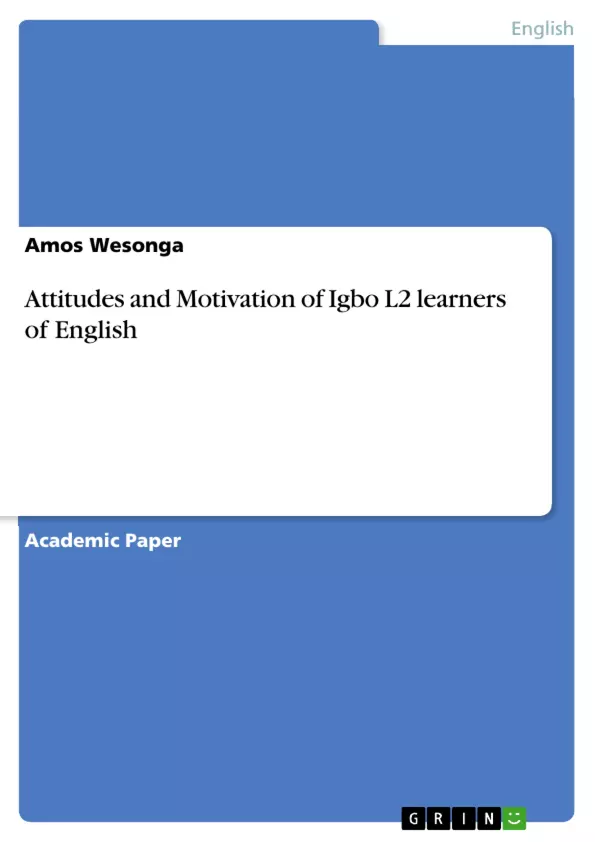Nigerian learners of English as the second language do better in written as compared to when they speak. Mainly, their pronunciations do not rhyme with what they write. Thus, the focus of this research paper is to propose the need to analyze the attitudes and motivation of Igbo natives to learn English as their second Language. The proposal takes into account the definitions of related terms, the literature review that surrounds second language learning and the various factors that affect the same across the world, as well as the methods that are intended to be used to establish the outcome of the study. In its conclusion, the paper summarizes the reasons for the choice of topic and methods of collecting and analyzing data, as well as the potential outcome.
Inhaltsverzeichnis (Table of Contents)
- 1.0 Introduction
- 2.0 Literature Review
- 3.0 Research Questions
- 3.1 What is the motivation for learning English as a second language for Igbo native speakers?
- 3.2 How do the learners' learning styles affect their attitudes towards learning English?
- 3.3 What causes disconnection between Igbo natives written and spoke English knowledge?
- 4.0 Conceptual Framework
- 5.0 Methodology
- 5.1 Population and sampling
- 5.2 Data Analysis
- 5.3 Ethics and Safety
Zielsetzung und Themenschwerpunkte (Objectives and Key Themes)
This research paper investigates the attitudes and motivation of Igbo natives towards learning English as a second language. It aims to analyze the factors influencing their language learning process, particularly the gap between their written and spoken English proficiency. The paper explores existing literature, proposes research methods, and outlines potential outcomes.
- Motivation and attitudes of Igbo L2 learners of English
- Factors affecting second language learning, including cognitive and affective elements
- The impact of learning styles on attitudes towards English acquisition
- The gap between written and spoken English proficiency among Igbo learners
- The influence of social contexts and personal characteristics on language learning
Zusammenfassung der Kapitel (Chapter Summaries)
- 1.0 Introduction: This chapter introduces the research topic by highlighting the disparity between written and spoken English proficiency among Igbo L2 learners. It underscores the importance of understanding the motivation and attitudes of Igbo learners to bridge this gap.
- 2.0 Literature Review: This chapter examines existing research on second language learning, particularly focusing on factors such as motivation, attitude, learning styles, and social context. It explores various theories and studies related to the influence of these factors on L2 acquisition, particularly in the context of Igbo learners.
- 3.0 Research Questions: This chapter presents the specific research questions that guide the study. These questions explore the motivation behind Igbo learners' pursuit of English, the impact of learning styles on their attitudes, and the reasons for the disparity between their written and spoken English skills.
- 4.0 Conceptual Framework: This chapter introduces the theoretical framework that underpins the research. It utilizes Spolsky's model to analyze the complex interplay of factors contributing to Igbo learners' language proficiency, including age, motivation, social contexts, personality, learning opportunities, and previous knowledge.
- 5.0 Methodology: This chapter outlines the research methodology, including the population under study, sampling techniques, data analysis methods, and ethical considerations. It details the procedures for collecting and analyzing data, ensuring the reliability and validity of the research findings.
Schlüsselwörter (Keywords)
This research paper focuses on the attitudes and motivation of Igbo L2 learners of English, examining factors like learning styles, social contexts, and the gap between written and spoken English proficiency. It draws upon theories of second language acquisition, motivation, and attitude, employing research methods such as questionnaires and the Attitude/Motivation Test Battery (AMTB) to gather data and analyze the complex interplay of factors influencing Igbo learners' language acquisition journey. Key terms include: Igbo, English as a Second Language (ESL), motivation, attitude, learning styles, social context, written proficiency, spoken proficiency, research methodology, data analysis.
- Quote paper
- Dr. Amos Wesonga (Author), 2017, Attitudes and Motivation of Igbo L2 learners of English, Munich, GRIN Verlag, https://www.grin.com/document/439511



